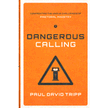Counselors Reflect on Dangerous Calling by Paul Tripp
A Series to Care for the Care Takers of God’s People

“The more separation and discontinuity there is between the real details of my personal life and my public confession and image, the more I will tend to fear being known. I will fear how people would think of me and respond to me if they really knew what was going on in my life… My responses to the concerns and inquiries of others become structured by fear rather than faith. So I do not make the regular, healthy confessions of struggle to my ministry co-partners, I do not ask candidly and humbly for prayer in places where I clearly need it, and I am very careful with how I answer personal questions when they come my way… I am trying to do what none of us is able to do—spiritually make it on my own. Autonomous Christianity never works, because our spiritual life was designed by God to be a community project.” Paul David Tripp in Dangerous Calling, page 38, italics mine.
The U.S. culture is one of autonomy. We have self-check-out aisles, “Do it Yourself” books and magazines, ATM machines, and computerized devices that help remind us to do things. We live in a culture of individualism, but Christianity is not something that we can live out by ourselves. From the beginning of creation, God stated, “It is not good for man to be alone” (Gen. 2:18). God did not create us to be autonomous beings. If there were the case, would the Lord have created Eve? Adam and Eve not only had a relationship with God, but they were to have a relationship with each other. Genesis 2:18 highlights the sacredness of the marital relationship, but it extends further. The Lord created Adam and Eve to live in community.
Jesus came to Earth as a single adult. If there were anyone that could have lived an independent life, it was Jesus! He was 100% man and 100% God, and God was His Father! Living independently is not what we see Jesus doing. He lived within the context of relationships. On the eve of His death, He prayed that believers would be one (John 17:11, 21-24)—not one as individuals, but one unified body. He knew that we would need each other.
Perhaps one of the biggest temptations in ministry is not letting others into how we are really doing. When people ask, “How are you?” we are quick to give a response that we think that they want to hear. Though there is wisdom to the extent in which we share with others, we probably lean toward the more “sugar-coated” version. I know I do. Vulnerability is hard. We have no control over what someone is going to do with that information. We fear others’ reactions. Ministry is not just about Jesus and me—it must also be about others. I need others to point me to truth. I need others to listen to me and encourage me. I need others to counsel and admonish me. Sure, I must nurture my walk with the Lord, but I must also recognize the importance of fellowship with my brothers and sisters in Christ. What about you? Are you living in community, or are you living as an autonomous Christian?
 Dangerous Calling: Confronting the Unique Challenges of Pastoral Ministry By Paul David Tripp / Crossway Books & Bibles
Dangerous Calling: Confronting the Unique Challenges of Pastoral Ministry By Paul David Tripp / Crossway Books & Bibles